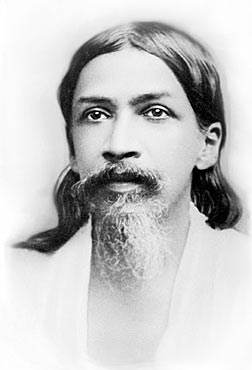WIT AND HUMOUR IN SRI AUROBINDO’S TALES OF PRISON LIFE
Kalpana Bidwaikar and Beloo Mehra

One of the many remarkable aspects of Sri Aurobindo’s personality was his amazing wit and unique sense of wry humour. It was not without reason that Sri Aurobindo has been referred to as the ‘The Smiling Master.’ In the books such as Correspondence with Sri Aurobindo, Talks with Sri Aurobindo and Champaklal Speaks, there are innumerable instances of how Sri Aurobindo’s beautiful smile, charming expression and witty one-liners spoken while acknowledging or responding to something from the most mundane to most profound made everyone around him totally at ease and completely fall in love with the outer personality of the Divine Master. Nirodbaran’s book titled Sri Aurobindo’s Humour is an excellent collection of his correspondence with the Master that clearly reveals for the readers this facet of Sri Aurobindo’s expression and personality.
Wit according to The Glossary of Literary Terms is “a kind of verbal expression which is brief, deft, and intentionally contrived to produce a shock of comic surprise…The surprise is usually the connection or distinction between words or concepts which frustrates the listener’s expectation, only to satisfy it in an unexpected way” (M. H. Abrams, 7th edition, Prism Books, 1999, second reprint 2004, p. 330). In this essay we have compiled a short sample of selected excerpts from Sri Aurobindo’s Tales of Prison Life (Sri Aurobindo Ashram Publication Department, Pondicherry, 1997) to highlight the charming wit of Sri Aurobindo in order to demonstrate how his writing even in the most stressful of situations (stressful for the ordinary people) carried his unique and amazing sense of humour that was also marked with a keen sense of observation, insight and compassion.
Exactly a hundred years ago in May 1908 Sri Aurobindo was imprisoned in the Alipore jail for one year and was acquitted in May 1909. This year is the centenary of his imprisonment. So this short review of some of the passages from the Master’s writings concerning this one year period is quite timely. Sri Aurobindo wrote about his experiences in the jail in ‘Kar-kahini’ in the Bengali journal Suprabhat in 1909-1910. This was later translated into English by Sisir Kumar Ghose as Tales of Prison Life.
Let us begin by stating that what we ordinarily refer to as imprisonment is not at all how Sri Aurobindo regarded that one year period. He writes:
“I have spoken of a year’s imprisonment. It would have been more appropriate to speak of a year’s living in a forest, in an ashram or hermitage. For long I made a great effort for a direct vision (sakshat darshan) of the Lord of my Heart; had entertained the immense hope of knowing the Preserver of the World, the Supreme Person (Purushottam) as friend and master. But due to the pull of thousand worldly desires, the attachment towards numerous activities and the deep darkness of ignorance I did not succeed in that effort. At long last the most merciful all-good Lord (Shivhari) destroyed all these enemies at one stroke
